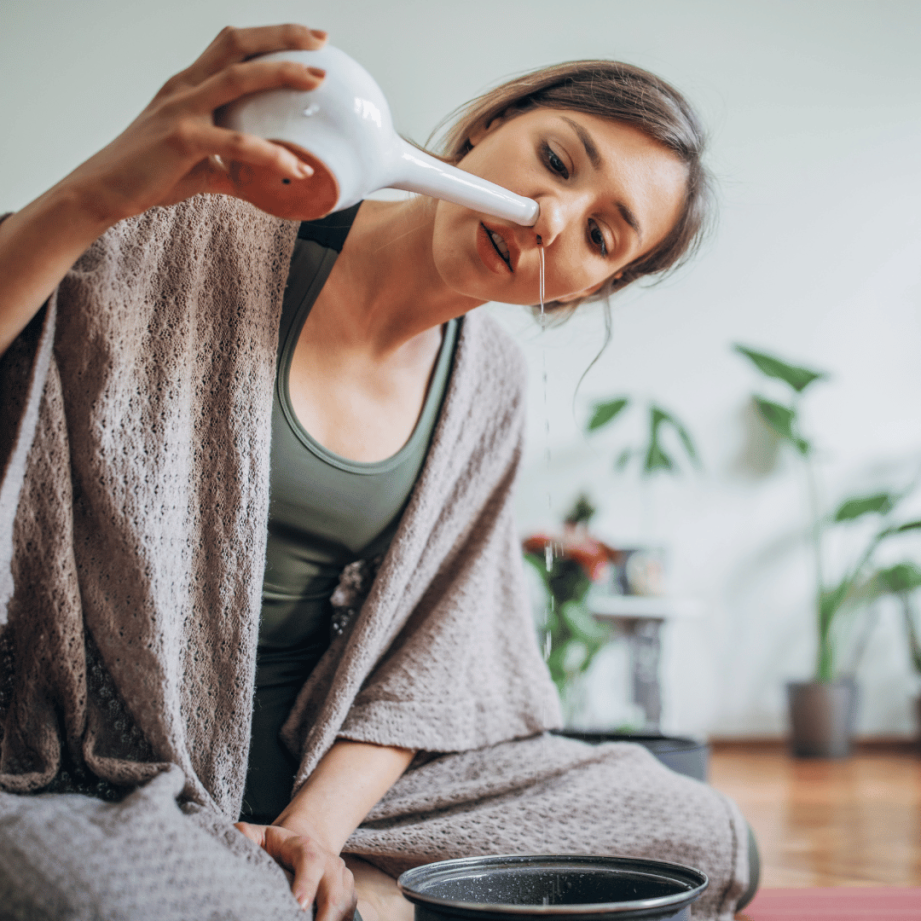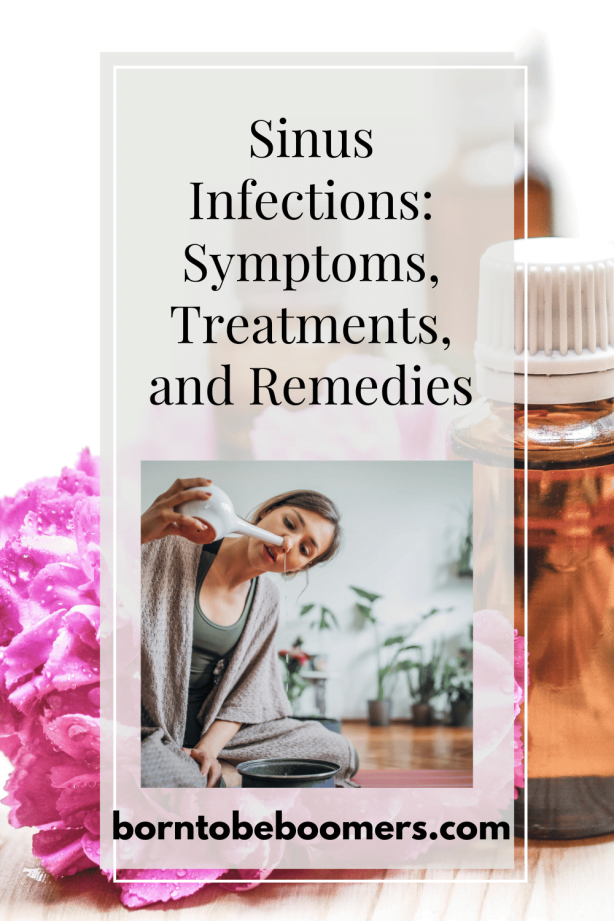Sinus infections, or sinusitis, refer to the inflammation of the sinuses and nasal passages. A bacterial or viral infection, an allergic reaction, seasonal allergies, or other health conditions like a deviated septum or nasal polyps can cause it. Common...
Sinus infections, or sinusitis, refer to the inflammation of the sinuses and nasal passages. A bacterial or viral infection, an allergic reaction, seasonal allergies, or other health conditions like a deviated septum or nasal polyps can cause it.
Common symptoms include facial pain and pressure, sinus pain, sinus headache, nasal congestion, runny nose, sinus pressure, and sore throat. In severe cases, like acute sinusitis, people may have a high fever and difficulty breathing.
Sinus infection symptoms can usually be managed at home with natural or over-the-counter remedies. Various treatments are available to get over a sinus infection fast, depending on the severity of the condition and its cause.
For example, if a virus causes the infection, it typically does not require medical treatment. On the other hand, antibiotics may be necessary in the case of a bacterial infection.
However, overuse of antibiotics can lead to antibiotic resistance and other long-term health problems. In addition, OTC medications like a neti pot, decongestants, and pain relievers are also available to help reduce symptoms.
Causes of Sinus Infections
Bacteria, viruses, seasonal allergies, or other health conditions can cause sinus infections. Bacterial sinusitis typically arises from a cold that has become more serious over time. Viral infections usually result from the common cold, flu, or upper respiratory tract infection. Seasonal allergies and dust mites are also common triggers for sin.
See Also: Top 8 Reasons To Buy An Air Scrubber vs. An Air Purifier
Diagnosing a Sinus Infection
If the usual treatments arenít working or the symptoms are severe, it is essential to visit a healthcare provider. The doctor may perform a physical exam and ask about your medical history. They may also order lab tests to determine the cause of your sinus infection and suggest an appropriate treatment plan.
Medical Treatment Options for Sinus Infections
Medical treatments for chronic sinusitis may include prescription medications, steroid nasal sprays, and sinus surgery. Prescription medications can help reduce inflammation in the sinuses and clear up the infection. Steroid nasal sprays can also be used to reduce swelling and shrink the size of inflamed sinus cavities. In severe cases, balloon sinuplasty may be necessary.

Natural Remedies to Get Over a Sinus Infection Fast
Some may opt for natural remedies because of high blood pressure concerns. There are a variety of natural remedies you can try to get over a sinus infection fast. First, it is vital to keep your body hydrated by drinking plenty of fluids to reduce inflammation in the nasal passages.
In addition, saline rinses, neti pots, and steam inhalation can help clear out mucous and open the airways.
Using a neti pot for a sinus infection effectively reduces symptoms and opens up the nasal passages. The neti pot helps flush out infected mucus from your sinuses, reduce inflammation, and increase hydration. It uses salt water or a saline solution to rinse away bacteria and other irritants that can cause a sinus infection.
However, it is vital to use sterile or distilled water and follow neti pot instructions carefully to avoid any disease risk. Using a warm compress on the face can also effectively reduce sinus pain caused by an infection. The heat from the compress helps relieve pressure in the sinuses, leading to relief from facial pain, headache, and congestion.
It also helps loosen up mucus so it can be more easily drained through the nose. Using a warm compress is one of the best things you can do to reduce sinus infection symptoms and get over it quickly.
You can also try using a warm compress or a hot shower to reduce facial pain and pressure. In addition, essential oils like eucalyptus oil, peppermint oil, and tea tree oil have been shown to have anti-inflammatory properties that can help clear up the infection.
It is essential to get plenty of rest and avoid irritants. Finally, building up your immune system is crucial to prevent chronic sinus infections in the future.
Prevention Tips for Avoiding Future Sinus Issues
The best way to avoid sinus infections is to prevent them in the first place. Keeping your nasal passages clean by washing them with salt water or using saline nasal sprays is essential to reduce your risk of developing a sinus infection. Avoiding secondhand smoke and other air pollutants can also help reduce your risk.
Additionally, if you suffer from seasonal allergies, treat them as soon as possible. Practicing good hygiene and avoiding sharing items with young children or people with colds is also important. Finally, managing any underlying medical conditions is essential to reduce your risk of sinus infections.
Dental problems can have a direct impact on the development of sinus infections. For instance, tooth decay or infection can cause an accumulation of bacteria in the mouth, leading to inflammation and irritation in the sinuses. Additionally, impacted teeth that havenít been appropriately treated may result in dental abscesses, which can spread to the adjacent sinuses.
It is best to visit your dentist regularly and seek proper treatment for any dental issues contributing to your sinus infection. With the proper care and preventive measures, you can keep your sinuses healthy and reduce your risk of uncomfortable sinus issues.
When to See a Doctor about Your Sinus Problems
If you experience sinus symptoms for more than ten days or if they become severe, it is essential to consult with your healthcare provider. Your doctor can determine the cause of your sinus infection and provide an appropriate treatment plan. They can also discuss other potential medical conditions causing your symptoms and suggest lifestyle modifications that may reduce your risk of developing future sinus issues.
Final Thoughts
Use natural remedies for relief, like neti pots, vitamin c, and essential anti-inflammatory oils. Take over-the-counter medications for pain relief and decongestants at the first onset of symptoms. Use nasal sprays and drops to reduce inflammation in the nasal passages. Avoid smoke and other air pollutants. Seek medical advice if symptoms persist or become worse.Treat underlying causes, like allergies and colds, as soon as possible to reduce your sinus infection risk. If you experience persistent or severe symptoms, visit your healthcare provider for an evaluation and appropriate treatment. Understanding the causes and treatments for sinus infections allows you to get over a sinus infection quickly and avoid future issues.
Pin it for later!

The post Sinus Infections: Symptoms, Treatments, and Remedies appeared first on Born to be Boomers.


